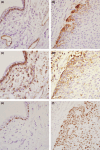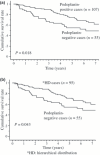Expression of podoplanin, CD44, and p63 in squamous cell carcinoma of the lung
- PMID: 19681903
- PMCID: PMC11158176
- DOI: 10.1111/j.1349-7006.2009.01295.x
Expression of podoplanin, CD44, and p63 in squamous cell carcinoma of the lung
Abstract
Recent molecular biological studies have identified podoplanin as a candidate cancer stem cell (CSC) marker in squamous cell carcinoma (SqCC). The purpose of this study was to examine the expression pattern of podoplanin, and the other stem cell markers CD44 and p63, and their relationship to clinico-pathological features including survival in pulmonary SqCC. We examined histologically the expression of podoplanin, CD44, and p63 in 162 consecutive SqCC by immunostaining. Podoplanin expression was observed in 107 (66%) tumors, CD44 in 145 (89.5%), and p63 in 151 (93.2%), respectively. In 95.3% of the podoplanin-positive tumors, tumor cells showing strong expression were localized in the periphery of the tumor nests. However, this peripheral localization was observed in only 55.9% of the CD44-positive and 43% of p63-positive tumors. In 88.8% of the podoplanin-positive tumors, positive cells were localized more peripherally in the tumor nests than CD44- or p63-positive cells and when CD44 and p63 expressions were compared in these podoplanin-positive tumors, p63-positive layers in the periphery of the tumor nests were broader compared to CD44-positive layers. These findings suggest tumor cells are aligned in the "hierarchical distribution pattern" according to the expression of these three markers. Patients who had podoplanin-positive tumors with the "hierarchical pattern" resulted in significantly better overall survival than those who had podoplanin-negative tumors (P = 0.043). These results suggest that podoplanin expression would reflect the most immature status in the differentiation process of SqCC, and SqCC with hierarchical expression would be a well-organized tumor group with lower biological aggressiveness based on the CSC concept.
Figures



References
-
- Fukuoka M, Yano S, Giaccone G et al. Multi‐institutional randomized phase II trial of gefitinib for previously treated patients with advanced non‐small‐cell lung cancer (The IDEAL 1 Trial) [corrected]. J Clin Oncol 2003; 21: 2237–46. - PubMed
-
- Chang A, Parikh P, Thongprasert S et al. Gefitinib (IRESSA) in patients of Asian origin with refractory advanced non‐small cell lung cancer: subset analysis from the ISEL study. J Thorac Oncol 2006; 1: 847–55. - PubMed
-
- Shepherd FA, Rodrigues Pereira J, Ciuleanu T et al. Erlotinib in previously treated non‐small‐cell lung cancer. N Engl J Med 2005; 353: 123–32. - PubMed
-
- Weissman IL, Anderson DJ, Gage F. Stem and progenitor cells: origins, phenotypes, lineage commitments, and transdifferentiations. Ann Rev Cell Dev Biol 2001; 17: 387–403. - PubMed
Publication types
MeSH terms
Substances
LinkOut - more resources
Full Text Sources
Medical
Miscellaneous

